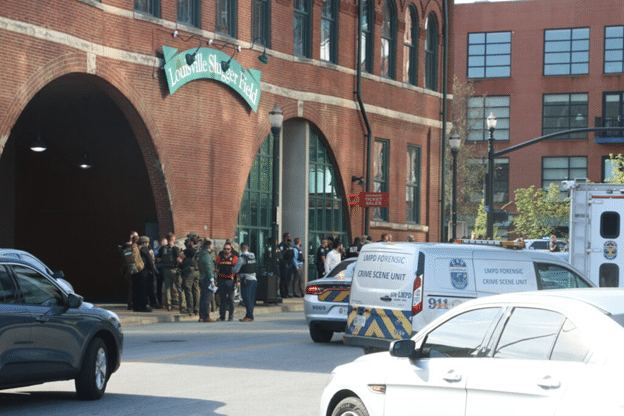By Marc Ramsingh
It’s been over a week since former Old National Bank employee Connor James Sturgeon used a legally obtained assault rifle to kill 5 people and injured 9 others.
This past weekend, a gunman killed 2 and injured 6 others at Chickasaw Park.
Being victim to a few gun-related incidents myself I know how intense and scary that moment can be. I’ve been in a mall when a gun was used during an altercation, I’ve been held up at gunpoint on U of L’s campus and part of my duties as an RA include training on handling a guest who has a firearm.
The mass shooting in downtown Louisville marks the U.S.’s 146th mass shooting since 2023 began. What can be done about the current gun violence epidemic in the U.S.? Why is this happening to seemingly only us and not our counterparts abroad?
An unfortunately, growing epidemic
First, we must look at the factors contributing to the epidemic. To obtain a gun in Kentucky you must be 21 years old, provide a state ID, and be subject to an instant background check via a licensed firearms dealer — this doesn’t apply to private sales. The first problem is sales of all firearms should be tracked and only sold to those who passed the requirements.
Most federal background checks search for information like:
● If you have any prior conviction(s) of a crime with a sentence of more than one year
● If you are under indictment for a crime with a sentence of more than one year
● If you are determined by a court to be mentally unsound. Simply recieving mental healthcare realted services does not prevent you from buying a gun.
● Your immigration status
● Any history of domestic violence
● If you are subject to a protective order against threats of domestic violence
● And if you have been dishonorably discharged from the U.S. Armed Forces.
On paper sure these requirements appear good enough. In such states where all gun sales are required to undergo a background check, however, the checks can all be avoided if someone travels to a neighboring state to purchase a firearm via a private sale.
Another problem that is posed is the types of weapons we allow to be available for sale. The U.S. allows the purchase of handguns, hunting rifles, shotguns, and semi-automatic weapons. The first big step that I feel should be made must be a ban on assault rifles, moving automatic rifles from tightly regulated to banned for civilian use, and moving semi-automatic weapons from what is essentially free reign, to banned for civilian use. There is a push from the Biden Administration for an assault weapon ban– however political power must align in a way that can’t be expected until the next election.
I question the extent that the right to bear arms be fully supported. The use of hunting rifles & shotguns needs higher regulation, though they have not been the weapon of choice for mass shootings. It is one thing to protect yourself and your loved ones with a handgun, but I believe that ownership of the controversial AR-15 — unfortunately infamous in shootings such as Pulse and Sandy Hook — should not be for domestic sale given its heavy military use.
The CDC was disabled from investigating gun violence as a public health issue via the Dickey Amendment in 1996. Congress should enable public health resources (think intervention programs) for communities affected by gun violence. This would allow the CDC to conduct in-depth research with information and tools that only the federal government has access to, utilizing them to best find ways to avoid gun violence and prevent unjust gun ownership.
Photo Courtesy // Liam Niemeyer, Kentucky Lantern //






